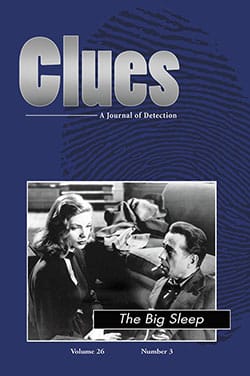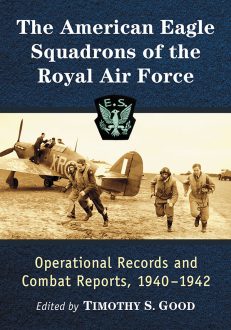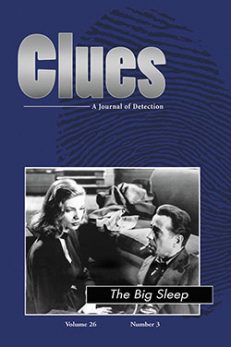Clues: A Journal of Detection, Vol. 26, No. 3 (Fall 2008)
Print Back Issue$30.00
In stock
About the Book
BACK ISSUE
This is a single back issue only. To order a current subscription, or for more information, please visit the journal’s web page at CluesJournal.com. Back issues from earlier volumes of Clues are available for order subject to availability. Also, single issues of the current volume may be ordered one at a time. Individuals may order back issues directly from our online catalog, and the charge for individuals is $30 (excluding postage). Issues from Volume 33 to the present are also available in ebook format on Kindle, Nook and Google Play.
The charge for single issues for institutions is $75 per issue (excluding postage). If your institution requires a back issue, please contact us to order at the appropriate rate.
About the Author(s)
Bibliographic Details
Executive Editor Margaret Kinsman
Managing Editor Elizabeth Foxwell
Format: softcover (6 x 9), back issue
Pages: 90
Bibliographic Info:
Copyright Date: 2008
ISSN 0742-4248
Imprint: McFarland
Table of Contents
Male Gothic Detection and the Pre-Raphaelite Woman in Lady Audley’s Secret
Emily E. Auger 3
The author considers Mary Elizabeth Braddon’s Lady Audley’s Secret (1862) as a detective novel marked by both literary and artistic gothic characteristics, including the classic “locked room” and “locked trunk” motifs, as well as Lady Audley’s pre–Raphaelite portrait. This portrait is revealed as both clue and a-priori “truth” in the detective’s investigation of Lady Audley’s fraudulent upward class mobility.
“Petticoated police”: Propriety and the Lady Detective in Victorian Fiction
Arlene Young 15
Through an examination of nineteenth-century stories and articles featuring female detectives, this essay examines the figure of the Victorian female sleuth, focusing on the class and gender politics governing the entrance of women, real or fictional, into this area of work. The author’s analysis includes interpretations of the cultural content of both text and images from the stories.
Discipline and Detection: The Domestic Power of Women in Anne Perry’s Highgate Rise
Lewis C. Roberts 29
Anne Perry’s Victorian detective novels link women’s domestic power, criminal investigations, and social reform. Although she argues that women exercised social control through their domestic gaze, Perry finally can offer only the companionable marriage of Thomas and Charlotte Pitt as an answer to the violence of both the Victorian period and our own.
“Like tumbleweed drifting across a vacant lot”: The Mythic Landscape of Los Angeles in Chandler’s The Big Sleep and the Coen Brothers’ The Big Lebowski
Anthony Hoefer 42
The author contends that the Coen brothers’ 1998 film The Big Lebowski invites a critical revisiting of Raymond Chandler’s The Big Sleep; specifically, The Big Lebowski prompts readers to consider Chandler’s novel less as a tale of a corrupt, modern city than one of the emergence of a corrupt, modern city and the resulting disappearance of an overwhelmed, mythic frontier.
Marginal Man and Hard-Boiled Detective: Racial Passing in Robert Skinner’s Wesley Farrell Series
Sinéad Moynihan 56
The author argues that tropes of detection and racial passing are mutually compatible in Robert Skinner’s six New Orleans–set mysteries. Set in the 1930s, they feature Wesley Farrell, a businessman-turned-sleuth who is passing as white. A passing plot coupled with a murder mystery foreground the issues of detection, evidence and clues, guilt, confession, exposure, and the often gross disparity between law and justice.
The Shadow of the Dissident: Reflections on Francoism in Carlos Ruiz Zafón’s The Shadow of the Wind
Cinta Ramblado 70
The author focuses on the allusions to the civil war and the dictatorship that appear in Carlos Ruiz Zafón’s The Shadow of the Wind to demonstrate how the plot and the characters serve as tools in an exercise of historical and political memory. She focuses on Fermín Romero de Torres and Inspector Fumero, essential characters in the exercise of memory carried out in the novel.
Reviews
Merja Makinen. Agatha Christie: Investigating Femininity
Marty S. Knepper 86
Author Guidelines 88
Book Reviews & Awards
- “Clues is a must-have for readers and writers of crime fiction. Scholarly, thought-provoking, wide-ranging in its topics, Clues covers the crime and thriller map.”—Sara Paretsky
- “A. Conan Doyle, notoriously resentful of Sherlock Holmes’s success, liked to scorn ‘police romances’ as less significant and worthy of his talents than his other literary work. If he could have read Clues, the thinking mystery reader’s journal, he would surely have felt differently—and learned much he never realized himself about even his own landmark contribution to the genre, from which so much else by others has flowed.”—Jon Lellenberg, U.S. agent for the Arthur Conan Doyle estate
- “I love reading Clues. Every issue provides thought-provoking, well-researched articles. The variety and scope of the material found in Clues makes an unparalleled, ongoing contribution to our understanding of the role of crime fiction in our culture, and the genre’s reflection of its time and society.”—Jan Burke, Edgar-winning author of The Messenger (2009)
- “Clues is an important journal. It carries the torch of tradition that is the backbone of detective fiction. It goes below the surface and gets to the heart of what makes the genre so fascinating and valid today”—Michael Connelly, author of the Harry Bosch novels, including The Overlook (2007)
- “For erudite and fascinating truths about mysteries, follow the clues to Clues, the scholarly journal that is an essential resource for every serious student of the mystery”—Carolyn Hart, author of Death Walked In (2008)
- “With scholarship ranging from Poe to Peters, nothing beats Clues”—Joan Hess, author of Mummy Dearest (2008).






